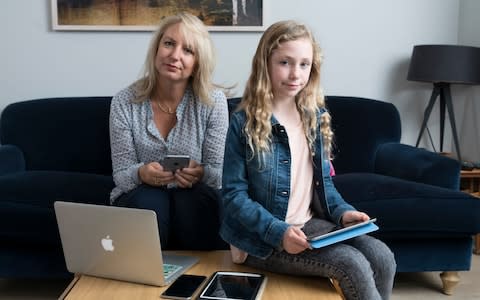Screens and teens: survival tips for parents on the technology battlefield

There was a moment recently when I thought I’d mastered the ongoing battle over my children and screen time. All was quiet upstairs (always a bad sign) so I went to investigate, and there were my two cherubs, Louisa, 12, and Josie, 10, playing Scrabble on the iPad in bed.
Ah, screens aren’t all bad, I thought. And yet… something felt fishy. I tiptoed back and burst in to find one daughter watching Pretty Little Liars on Netflix, and the other furiously scrolling through Snapchat on her iPhone.
Much hilarity ensued, and they were so pleased with their ingenuity that they hardly minded when I confiscated the screens. But the battle wasn’t over. In fact, it’s never over… and if I had a pound for every time I’ve talked to parents about the trials of getting children off screens, I’d be rich and retired in a Wi-Fi-free zone.
Most of us grew up in an age of no mobile phones… of books, magazines and long chats on the home phone
Laurel Ives
Forget alcohol, homework and partying – the most challenging issue for parents now is the smartphone lodged firmly in our offsprings’ grubby hands. They are spending more and more time online, and every week a new study emerges warning about the consequences; from social isolation to lack of concentration, to bullying, bad language and exposure to porn.
The most recent is a new report by Anne Longfield, the Children's Commissioner, called Life in Likes, which states that children become increasingly anxious about their online image as they head into their teens. Longfield said social media is exposing children to "significant risks emotionally", with a particular “cliff edge” as they transition from junior into secondary school - and warned that social media firms must take more responsibility for helping children through the challenges of life online, as children are at risk of “growing up chasing likes”.
Another note of caution has come from the recently published book, iGen: Why Today’s Super-connected Kids are Growing Up Less Rebellious, More Tolerant, Less Happy by Jean M Twenge, which claimed that the generation born between 1995 and 2012 were, for the first time, more likely to kill themselves than each other. And yet, at the same time as these dark warnings come the tech cheerleaders – those, like Robert Hannigan, the former boss of GCHQ, who say that children should spend more time online to “save the country”, or like researcher Dr Andrew Przybylski of the Oxford Internet Institute, who argue that moderate levels of screen time a day allow teens to “relax and decompress”.

It’s a minefield of confusion because it is all so new. It’s hard to remember the pre-smartphone age, and yet the iPhone celebrated its 10th birthday at the end of 2017. When it first arrived it was too expensive for most, but within the last few years it has become ubiquitous among under-18s, who often inherit their parents’ pre-upgrade phones. And as new social media and games have sprung up like sweet shops, young people are more than happy to gobble them up.
As parents we’re in the unique position of having no rule book, map or compass to guide us in this new world, and cannot even turn to our own parents for advice. Most of us grew up in an age of no mobile phones… of books, magazines and long chats on the home phone (ours stretched from my parents’ bedroom to mine, creating a perilous tripwire). As adults we’ve stumbled into this unregulated digital space blindly, knowing that we should embrace it, and get to grips with digital, because it is changing everything, from work to shopping to socialising.
Yet how can we tell our children to get off social media, when we ourselves are regularly updating our feeds, when social media has become a key tool for work, and for many a way to make money? Once, after I had announced one of my many futile attempts at a family “digital detox”, my husband (who works in news) disappeared. I hunted around the house and finally found him crouched under a coat in a cupboard, furtively posting on Twitter.

Our own use of devices makes it harder to police our children and follow the experts’ sometimes draconian and unrealistic advice. Limit screen time to 30 minutes a day? Easier said than done, particularly when their homework is often done online. Don’t give them a smartphone? Fine, but then when all their friends are communicating on Snapchat, our child is the one left out.
Screens are here to stay, so what can beleaguered, overworked and stressed-out parents do?
1. How much time should my child really spend online?
How much time a child spends online is a thorny issue, as there are no official guidelines. Anne Longfield, the Children’s Commissioner, is at pains to emphasise that her starting point is that technology “doesn’t have to be a bad thing”. However she does recommend that parents “familiarise themselves with what their children are looking at to check they are happy”.
I recommend focusing on times of day; for example no screens before school, no screens at mealtimes, no screens at bedtime
Noël Janis-Norton
Snooping on your child’s search history might reveal they’ve been watching Love Island or Vampire Diaries, for example, which some might deem acceptable for teenagers, but not for younger children. Try to keep screen use in a public place as far as possible, and watch for more general signs of distress. “If your child is getting socially withdrawn – spending time online when they used to see friends, or showing anxiety at the prospect of no screens, like the kids I knew who didn’t want to go on a flight because there was no Wi-Fi, then there’s an issue,” says Longfield.
Noël Janis-Norton, a parenting coach and author of Calmer, Easier, Happier Screen Time, says parents need to set their own guidelines, and wean their children away from screens gradually. “If a young person is in front of a screen for six hours a day, then getting it down to three hours is a huge achievement. I recommend focusing on times of day; for example no screens before school, no screens at mealtimes, no screens at bedtime.”
Ultimately experts agree that what parents are facing is a matter of damage limitation. Less time on screens is going to mean less time absorbing inappropriate content, advertising messages, inane celebrity gossip, bullying and sexualisation. On a holiday to New York, I was amazed when my 12-year-old wanted to buy a Kylie Jenner lip kit. Of course teenagers have always wanted make-up, but in the past you only saw the adverts on TV, or in teen magazines. Now they’re sneaking into their social-media feeds at a younger age.
Again, less time online equals less exposure. Dr Richard Graham, a child and adolescent psychiatrist who founded the UK’s first technology addiction service at the Nightingale Hospital in London, says: “It makes sense that if the window is not open so wide, less dirt will fly in.”

2. How can I get my children to read books in bed, not chat online?
The simple answer is to put in place a screen curfew, and be bold enough to stick to it. Everyone agrees that one of the biggest issues with phone use is their ability to disrupt sleep. Messages from friends ping in until late at night (there always seems to be someone among your child’s circle of friends who is still awake and posting past 11pm), and the blue light from the screen keeps you awake.
Social media channels are designed to keep us engaged, to fight for our attention in a crowded media landscape. Dr Richard Graham advises going on to the American Academy of Pediatrics website to determine the length of sleep your child needs for their age, then calculate their bedtime based on the time they have to get up. An hour before that time, parents should remove all screens.
“This sleep calculator is a great tool to use with a young person; it normalises it, rather than them thinking you are the lone puritan parent. Sleep is vital to health and well-being.” Watch for the hiding of screens under the duvet. You know you’ve failed when you catch that telltale blue shaft of light emanating under the bedroom door.

3. I’m going to limit their screen time. How can I avoid huge rows?
It’s likely that removing screens or implementing limits will mean tantrums, and the most common lament: “None of my friends’ parents are this mean. My best friend has an iPhone 7 and is allowed it at night,” and so on. Stay cool and stay strong. The worst thing to do is lose your temper. Explain why you are doing what you’re doing. If the row is hotting up, take a five-second break. Then, advises Noël Janis-Norton, if your child stops shouting, praise them for doing so.
The biggest gift we can give our children is to help them think critically about what it all means
Claire Katzenellenbogen
Mandy Saligari, addiction expert and founder of the treatment centre Charter Harley Street, says: “The kid kicks off in the moment because they are caught up with a powerful drug. It’s important that the parent notices the agitation, and says something like, ‘I can see you’re really upset’. I hear stories of parents wrestling with kids to get phones, and all that does is make the situation worse.”
It helps to give a warning. Tell the child they have half an hour of screen time left, then you will be taking the phone away. Or allow screen time as a reward for homework.
Says Janis-Norton: “When parents are firm and consistent, young people respond well. They will be upset, but they get over it, and start to read, spend more time with their friends, write stories, walk the dog…”
The more you talk to your children about your reasons for limiting their phone and computer use, the easier it will be. And try to do it early; the older they are, the harder it is to enforce limits. Claire Katzenellenbogen, director of Parent Gym, which runs parenting courses, emphasises the importance of developing critical thinking: “The biggest gift we can give our children is to help them think critically about what it all means. That the beautiful photos they see on Instagram might look real, but have often been doctored.”
This is useful when dealing with anxiety provoked by images of beautiful celebrities, or the fear of missing out engendered by say, seeing your friends having fun and realising you haven’t been invited. Explain that nobody posts a sad, lonely or unflattering picture, and that one picture never tells the whole story.

4. My child’s online chat is turning nasty. What should I do?
Soon after her son Oskar joined Year 7 in secondary school, Anna Golawski, a coach at Parent Gym, was shocked to get a call from the head teacher. “One of the parents had complained about online bullying going on in the WhatsApp group my son was part of. Up to this point the chat had been friendly, it was a large group of them in Year 7, and they chatted about football and the like. But one of the boys had started texting things like, ‘you smell’ and ‘you’re a retard’ and my son had responded in kind. Then they changed the name of the group to ‘We hate XXX’.”
In the playground those sorts of comments might be laughed off, or sorted out at the time, but post them on giant messaging groups, facilitated by social media platforms like WhatsApp, and the taunts feel far more humiliating because they reach so many so quickly and are written down in black and white. “We had to explain that if he was part of that group he had a responsibility to either change the behaviour, or get out of the group. We confiscated his phone for a month, and I noticed he was suddenly more engaged in football and board games.”
Schools have an opportunity here to smoke this out, and to talk to them about what is right
Dr Richard Graham
When I gave my daughter Louisa my old iPhone in Year 6, with no sim, I naively thought she would just play a few games. But within weeks there were giant chat groups operating via Wi-Fi and kids we didn’t even know were soon joining in. When she started Year 7, the chat groups became less benign, with girls calling each other unpleasant names and ranking each other. It started as a joke, but ended up being very upsetting for those who found themselves placed at the bottom.
Dr Richard Graham says this kind of behaviour can crop up at stressful moments for children: “At vulnerable times, and secondary transfer is one of those moments, young people are more likely to enact more aggressive behaviour as a way of staying included and getting attention, or they feel the tension of being a bystander to unpleasant behaviour. Schools have an opportunity here to smoke this out, and to talk to them about what is right.”
Schools are doing a good job of educating children about online safety, but as yet there seems to be little advice given on how to behave as a good digital citizen. If you can, try to avoid giving your child a phone until secondary school. I’ve learnt my lesson and my younger daughter Josie is having to wait until secondary school. The cries of “unfair!” are gradually diminishing.
5. My children worship at the altar of social media. Have I lost them?
One of my daughter’s friends sets her alarm 10 minutes before she has to get up for school in order to respond to her friends’ Snapchat streaks. Streaks are the darkly ingenious way the platform keeps your teen engaged. You gain streaks by interacting with friends, and you lose them when you don’t respond.
Snapchat (like all social media channels) is addictive. Many studies have proved the link between a “like” on a post and a dopamine hit to our brains. “I think parents should consider banning Snapchat in the house,” says Anne Longfield. “It is just so pervasive into the child’s psyche. It’s really geared to making children worry about maintaining friendships, about being seen to maintain friendships and then about isolating them if they drop off. Being a teenager is difficult enough without worrying about your social standing.” Snapchat can also reveal where your child actually is in the real world, unless it is switched to “ghost” mode, and on the home page kids automatically see news updates from The Sun, E! News, MailOnline and more without subscribing, which might explain the skew in interest towards the Kardashians rather than, say, North Korea.
Snapchat and Instagram is also how young people communicate. My daughter and her friends rarely send text messages – “That’s for old people”. YouTube is the default option for teens to find out just about anything, and although it’s a video channel, the comments underneath the posts can be aggressive and undermining. It can also spread bad information, not to mention product placement.
This is a moment for setting limits and a discussion to encourage critical thinking. Teens are savvy and once you explain to them that they are a consumer pawn for internet giants to make money out of advertising and data, and that many of the influenc-ers they follow are paid to promote products, they start to wise up.

6. I think my son’s gaming habit is out of hand – when does it become an addiction?
Last week a head teacher at a London primary school told me he had observed that boys who were playing online games brought increased aggression into the playground. He’d watched some games himself and was stunned by the explicit violence and sexism. Gaming addiction is real – one friend of mine turns up to cocktail bars with gaming controls in her handbag in an effort to control her sons’ gaming. Amber Greenfield* has a cautionary tale. Her son is now 21, but his gaming addiction started in primary school, and by the time he was 14 he was gaming for up to five hours a day.
“We felt he was exhausted, that he had no time to do his homework, so we went to see his school. But they told us it was normal, so after our meeting we thought we were maybe overreacting. We tried to understand what he was getting out of it. Well, he was rather good at it, it was giving him street cred with his friends, and playground recognition.”
His gaming friends would talk to each other online in the most awful language
Amber Greenfield
Yet the addiction got worse and he became increasingly withdrawn and aggressive. Desperate, Amber and her husband tried turning their Wi-Fi off at 10.30pm, and taking the router into their bedroom. But their son would sneak in when they were asleep, and by the morning it was back on. They saw therapists and counsellors, but nothing worked, their son would always find a way to game. By the sixth form, he was skipping school and going to gaming hubs for the entire day. He was also playing online and staying up all night to compete in different time zones.
“We felt helpless, with no one to turn to. It impacted on the whole family and overshadowed everything. His gaming friends would talk to each other online in the most awful language, which he would repeat. But he couldn’t bear that we would take away the one thing that made him happy. He did everything he could to make us miserable when we tried to limit it.”
In the end Amber’s son, a very able child, was able to get a decent set of A-levels despite being rarely at school and made it to university. But even though he has now given up gaming, he has replaced it with online gambling. Amber was at the vanguard of the gaming revolution, and her son’s childhood coincided exactly with the growth of gaming and the smartphone. Could she have done anything differently? Can she offer any advice? “ I think in retrospect we should have put our own phones away more often. We were both on our phones a lot for work, so it was difficult, but it meant he could always accuse us of hypocrisy.”
* Not her real name

7. How can I use technology itself to help limit screen time?
Innovations are popping up all the time to help parents control screen time. I use OurPact – an app which allows you to switch off the apps on your child’s phone on a schedule. This worked for a while, until my computer-savvy daughter worked out how to hack it. Threats ensued, and now if she hacks she loses the phone. A gadget has recently launched called Circle With Disney. This claims to allow you to manage all the devices in the house, turning off individual apps and setting time limits for online usage. Commonsense Media is an American website that offers detailed reviews of the violence, sex and language in most films and TV programmes, so you can see what is appropriate viewing.
The charity Minded.org.uk has decent advice on dealing with specific social networks. And apps like Forest are popping up to help young people control screen time themselves. You plant a seed and a forest grows in the app and it’s shareable – the more time you spend on your phone the fewer trees grow. This is proving popular with teens looking to focus during exams.
8. But there are still positive effects of screen time, right?
Recently my daughter and two friends were invited to see an experimental version of Hamlet with just three actors. Since they are 12, and hadn’t read the play, I suggested they familiarise themselves with the plot. In true iGen style they found a “Bitesize” video from the BBC on YouTube in which Hamlet is set to rap, and the characters are animated. I was unsure, but it was brilliant and soon we were all rapping along in the kitchen. After the play they were delighted. “We were really glad we had watched the video beforehand, particularly as there were only three actors playing all the roles, so it was doubly confusing.”
Social media can help shy kids connect, has opened up a world of exciting information, aids research and school work, gives a sense of achievement, can allow them to decompress and express themselves, and allows us to check they are safe. Used positively, it’s a miracle.
It has also inspired our teens to be entrepreneurial. They see YouTubers who have made millions, and influencers who run successful businesses. As many core professions are being wiped out by the digital revolution, this awareness and knowledge should serve them well.
We can’t change the world that our kids find themselves in, but we can help them navigate it, and hopefully keep a sense of humour along the way.


